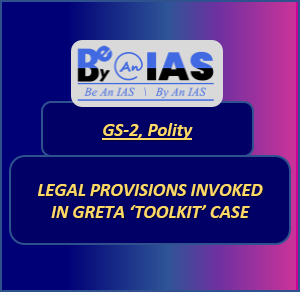CURRENT AFFAIRS
Get the most updated and recent current affair content on Padhaikaro.com
LEGAL PROVISIONS INVOKED IN GRETA ‘TOOLKIT’ CASE
- Be N By IAS, Delhi
- 19, Feb 2021

For : GS-2: Polity
CONTEXT:
An environmentalist, a lawyer and an engineer came on Delhi Police radar after a toolkit was shared by Swedish climate change activist Greta Thunberg in support of the ongoing farmers protests on the capital's outskirts.
ABOUT GRETA ‘TOOLKIT’ CASE:
- The Bombay High Court granted transit anticipatory bail to Shantanu Shivlal Muluk and Nikita Jacob in the Greta Thunberg toolkit case registered by the Delhi Police in connection with the ongoing protests against the three farm laws.
- The transit anticipatory bail has been granted to allow them to approach the competent court in the national capital for a pre-arrest bail.

LAWS ON ARREST OF A PERSON:
- Article 22 of the Constitution: Every person who is “arrested and detained in custody” has to be produced before the nearest magistrate within a period of 24 hours of the arrest.
- The period excludes the time necessary for the journey from the place of arrest to the court.
- No person can be kept in custody beyond the period of 24 hours without an order of a magistrate.
- Section 56 of the CrPC: It states that the person arrested has to be taken before the magistrate without unnecessary delay.
- Section 167 (2) of CrPC: When the Magistrate before whom the accused person has been produced does not have the jurisdiction to try the case or commit it for trial, the judicial officer is required to forward the accused to a Magistrate having such jurisdiction.
- Depending upon the case, the jurisdictional magistrate can authorise detention of the accused either by the police or send the person in judicial custody.
ANTICIPATORY TRANSIT BAIL:
- When a person is apprehending arrest by the police of a state other than where they are at present, they approach the nearest competent court for a transit anticipatory or pre-arrest bail.
- On the basis of personal liberty, the High Courts across India generally allow such prayer depending upon the merits of the case.
- The relief is sought to seek temporary protection from arrest and simultaneously get time to approach the appropriate court of that place, wherefrom the police has come or where the case is registered, for a similar pre-arrest bail.
TRANSIT REMAND: WHAT AND WHEN?
- The term “Transit Remand” is neither mentioned nor defined in the Cr.P.C.
- To put it simply, transit remand can be said to be the remand of the accused, sought by the police, for taking the accused from one place to another in their own custody, usually for the purpose of producing him before the concerned magistrate who has jurisdiction to try/commit the case (Jurisdictional Magistrate).
- This is done to comply with the provisions of law regarding the production of the accused before a magistrate within 24 hours since it may not be otherwise possible due to travel from one state to another.
The application is filed by the police which has come to arrest the accused, before the nearest magistrate of that area where the accused is at present or residing.
GAUTAM NAVLAKHA VS STATE-2018:
- Delhi High Court in 2018 held that “the Magistrate examining the transit remand application is not required to go into the adequacy of the material, he should nevertheless satisfy himself about the existence of the material”.
- Magistrate should ask the person arrested and brought before him whether he has been informed of the grounds of arrest and whether he was required to consult and be defended by any legal practitioner of his choice.
- The Supreme Court last year said the Delhi HC judgment shall not be treated as precedent and ordered that the questions of law are kept open.
- However, the apex court in different judgments has also held and reiterated that a Magistrate should not pass an order of remand automatically or in a mechanical manner.
SOURCE: Indian Express
MCQs:
Q. Consider the following statements regarding Transit Remand.
- The term “Transit Remand” is mentioned but not defined in the Cr.P.C.
- Magistrate examining the transit remand application is not required to go into the adequacy of the material.
Which of the above statements is/are NOT Correct?
- a) 1 Only
- b) 2 Only
- c) Both 1 and 2
- d) Neither 1 nor 2
ANS: A